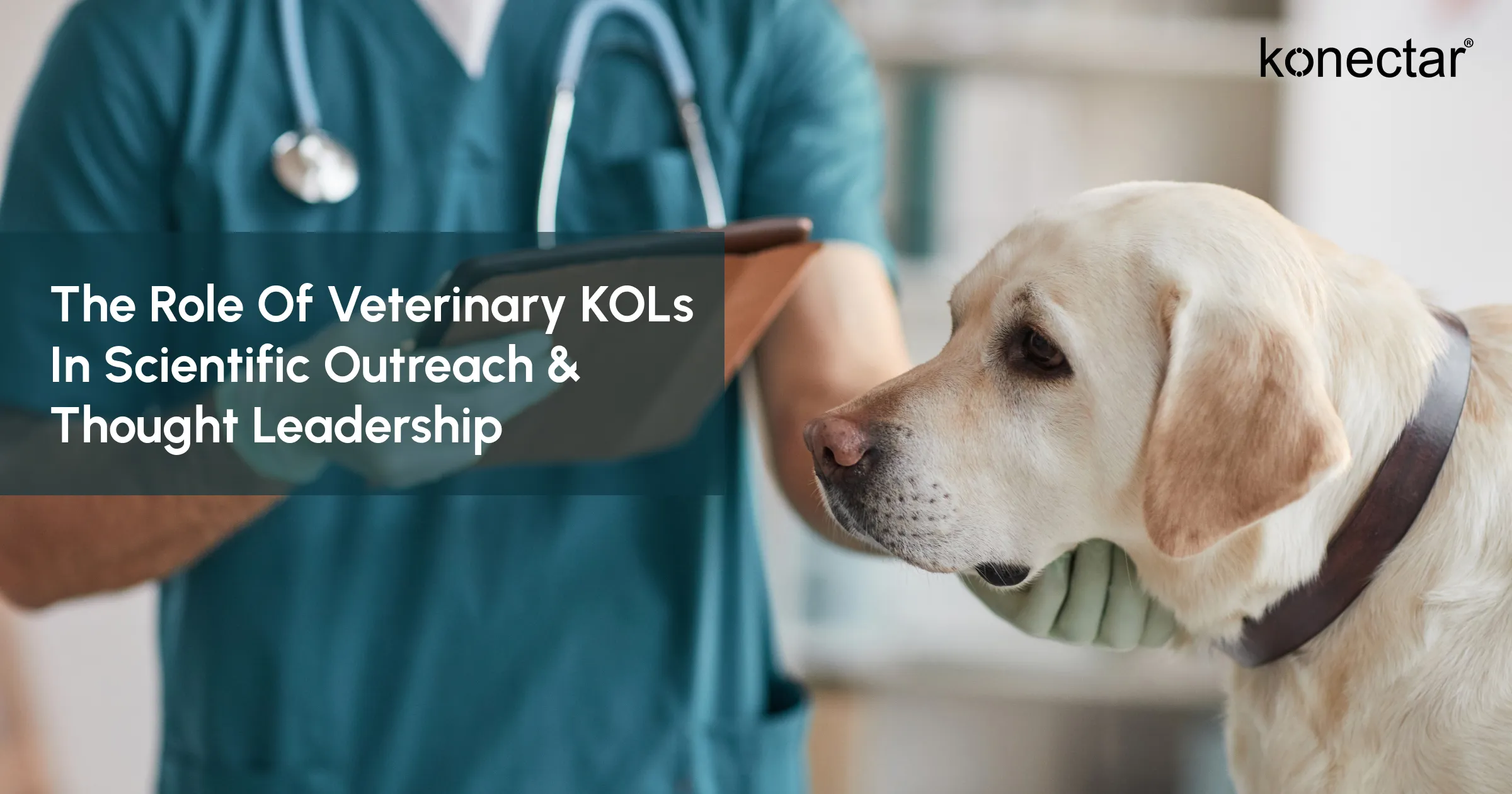26-09-2025
The Role of Veterinary KOLs in Scientific Outreach & Thought Leadership

Veterinarians are distinguished healthcare professionals who provide expert care across companion animals, equine medicine, and livestock health. Apart from being experts in their domain, they are thought leaders whose opinions can drive adoption of new therapies, influence clinical practices, and guide product development.
In this article:
- Understanding the Different Types of Veterinary Professionals
- Reaching the Right Veterinary KOLs: Why It Matters For Veterinary Companies
- Driving Brand Awareness and Growth
- FAQs
Understanding the Different Types of Veterinary Professionals
Veterinarians are diverse in their expertise, responsibilities, and the populations of animals they serve. From pets in households to livestock on farms, and from laboratory research to food safety, each type of veterinarian plays a unique and critical role in animal health and public welfare.
Understanding these different roles is key for organizations looking to engage effectively with veterinary KOLs and align strategies with their influence and expertise. Leveraging veterinary opinion leader management tools ensures that these diverse voices are identified and engaged effectively.
1. Small Animal Veterinarians
Small animal veterinarians make up the largest segment of veterinary practitioners. They primarily care for pets such as cats, dogs, and other household animals. Their responsibilities include diagnosing illnesses, performing surgeries, administering vaccinations, prescribing treatments, and providing end-of-life care.
Some small animal veterinarians also specialize in shelter medicine, focusing on the health and well-being of animals in shelters awaiting adoption. These veterinarians are often the first point of contact for pet owners and play a significant role in preventive care and community education.
2. Veterinary Specialists
Veterinary specialists pursue advanced training in specific areas of veterinary medicine. There are over 20 recognized specialties, ranging from anesthesiology, dentistry, and pathology to surgery. Specialists may also focus on specific species, such as equines, poultry, or wildlife.
They frequently serve as consultants for other veterinarians when specialized knowledge or equipment is required. For example, veterinary pathologists study animal diseases, while emergency veterinarians focus on critical care and urgent medical interventions.
3. Food-Animal Veterinarians
Food-animal veterinarians focus on livestock raised for human consumption, ensuring both animal welfare and food safety. They work closely with farms and ranches, monitoring herd health, preventing disease outbreaks, and advising on nutrition and husbandry practices.
These veterinarians often travel between locations to provide hands-on care and guidance to farmers, ensuring that livestock remain healthy and meet industry standards for production.
4. Food Safety and Inspection Veterinarians
Distinct from food-animal veterinarians, food safety and inspection veterinarians typically operate within government agencies or regulatory bodies, such as the U.S. Food and Drug Administration (FDA).
Their work centers on protecting public health by inspecting livestock, dairy, eggs, and meat products, ensuring sanitary processing, quarantining infected animals, and evaluating the safety of drugs and additives used in food production. These veterinarians are critical to maintaining compliance with national and international food safety standards.
5. Research Veterinarians
Research veterinarians bridge science, medicine, and innovation. They work for academic institutions, government organizations, or pharmaceutical and biomedical companies. Their responsibilities include conducting research, testing new drugs or medical devices, developing improved diagnostic techniques, and educating veterinary students.
By analyzing existing findings and developing new methodologies, research veterinarians contribute to advancing animal health, public safety, pharma/veterinary medicine, and scientific knowledge.
Reaching the Right Veterinary KOLs: Why It Matters For Veterinary Companies
Engaging with veterinary KOLs enables organizations to align scientific outreach with both clinical needs and commercial objectives. Veterinary companies can engage KOLs for multiple purposes:
- Supporting clinical research and product development.
- Educating practitioners through conferences, webinars, or training sessions.
- Building advocacy networks for new therapies, vaccines, or feed supplements.
- Strengthening trust among veterinary communities and end-users.
- Gaining strategic insights into market needs and treatment gaps.
Here, veterinary KOL engagement software can simplify outreach and ensure companies connect with the right experts efficiently.
How KOL Engagement Platforms Can Help
Leveraging a veterinary KOL engagement platform enables animal health companies to strategically engage influential experts across multiple objectives—ranging from prescribing and medical device implementation in clinics, participation as principal investigators (PIs) in clinical trials, authorship of scientific publications, to serving as expert speakers for product launches, conferences, and advisory sessions.
A KOL engagement software, konectar Veterinary, brings efficiency to the KOL identification and engagement process. By analyzing vast datasets across publications, clinical trials, social media, and medical conference participation, konectar identifies the most relevant veterinary KOLs quickly and accurately.
This saves companies valuable time while ensuring they connect with KOLs who align with their therapeutic areas, business goals, and regional priorities.
Driving Brand Awareness and Growth
Engaging the right veterinary KOLs through a structured, data-driven approach helps companies boost their brand presence. When KOLs endorse, collaborate, or educate, it amplifies credibility and brand awareness within the veterinary ecosystem. Ultimately, this strengthens company positioning in a competitive global market. Ready to Identify the Right Veterinary KOLs?
Request a demo of konectar today.
FAQs
- What is a veterinary KOL?
A veterinary Key Opinion Leader (KOL) is an experienced and respected veterinary professional whose expertise influences clinical practices, research, and product adoption across the animal health industry.
- Why should veterinary companies engage with KOLs?
Veterinary KOLs help companies accelerate adoption of new therapies, guide product development, and improve brand awareness through trusted influence within the veterinary community.
- How are veterinary KOLs different from human healthcare KOLs?
While both provide thought leadership, veterinary KOLs work across diverse animal populations—including companion animals, livestock, equine, wildlife, and food safety. Their influence spans not only clinical practices but also public health and food production systems.
- What challenges do companies face in identifying the right veterinary KOLs?
The veterinary ecosystem is broad and fragmented across specialties, species, and regions. Identifying relevant KOLs without structured data insights can be time-consuming, inefficient, and often leads to missed opportunities.
- How can the konectar Veterinary platform help?
konectar analyzes data from publications, clinical trials, events, and social media to identify, profile, and engage the right veterinary KOLs. This enables companies to save time, improve targeting, and build stronger relationships with healthcare experts.
- How does engaging veterinary KOLs improve brand awareness?
When veterinary KOLs educate peers, lead clinical research, or speak at industry events for a company, their credibility enhances the brand’s visibility and strengthens trust across the veterinary ecosystem.





